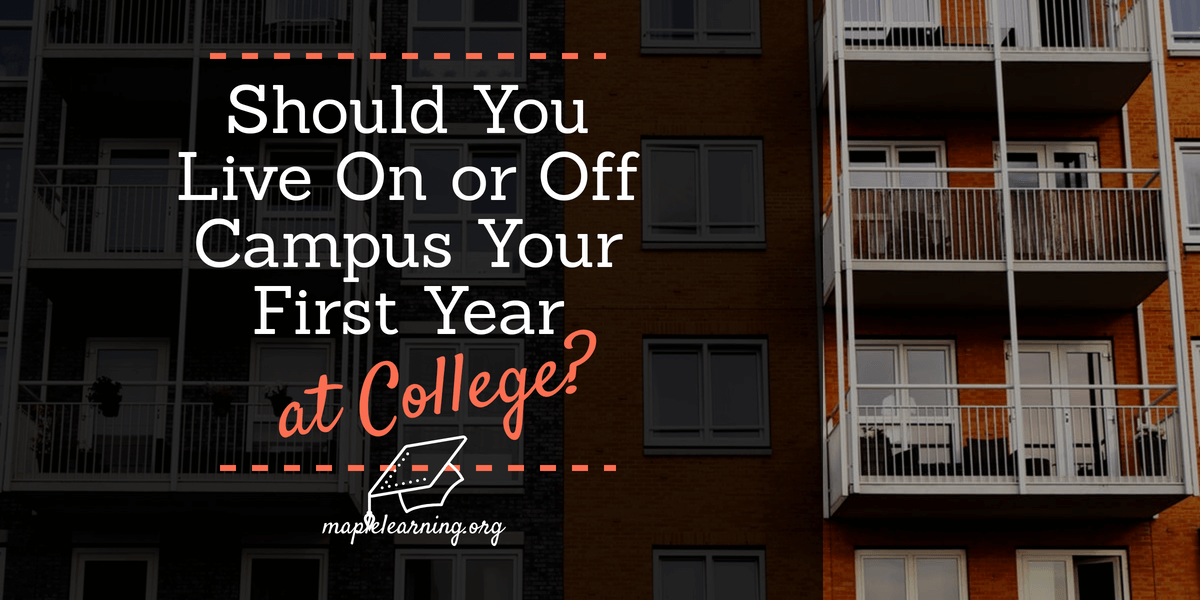Should You Live On or Off Campus Your First Year at College?
 Live On or Off Campus University acts as a time where 18- and 19-year-olds discover themselves. It’s a place where the decisions you make for yourself can have lifelong consequences. Where you live during these years is just one of the choices that you’ll make during this time. You might choose to live on campus, at home, or in an off-campus apartment. To help you fully explore your options, here’s a look at the pros and cons of living on and off campus.
Live On or Off Campus University acts as a time where 18- and 19-year-olds discover themselves. It’s a place where the decisions you make for yourself can have lifelong consequences. Where you live during these years is just one of the choices that you’ll make during this time. You might choose to live on campus, at home, or in an off-campus apartment. To help you fully explore your options, here’s a look at the pros and cons of living on and off campus.
Living on Campus
For most freshmen, living on campus may seem like a no-brainer. But you do have options to consider when choosing housing for your first year of college. Here’s a breakdown of what to expect from living in the dorms.
Pros
Dorm living means that every place you need to go is only a short walk away. As CollegeBasics points out, “The price of gas these days is making living on campus a much more economical choice in college living arrangements. There is also the time factor to consider. A short walk from your dorm to your 8 am class means you can sleep in longer.” Unlike commuter students, you can make your way to class whether or not there is gas in your car.
One of the best reasons to live on campus is that you’ll meet a lot of people without putting in a lot of effort. Before you know it, you’ll get acquainted with plenty of people who have the same interests and viewpoints as you.
Cons
When you live in your college dorm, it can get claustrophobic pretty quick. If you want to get away from your peers, you may have to take a bike or car ride to a quieter place. Take this opportunity to find places in your college town where you can go to relax and get away from the college scene.
Living Off Campus
Every college town is full of options for off-campus housing. Living in an off-campus apartment or at home with your parents has its benefits and drawbacks. Here’s what you should know.
Pros
Living off campus does have its perks. Commuting from home will allow you to avoid the chaos that can often come with living in a college dorm. The Westside Group explains, “Living in apartments close to campus means you have the opportunity to experience university life to the fullest, without being bound to a tiny cramped room of a dorm.” Beyond that, dorms always have young people coming in and out at all hours of the day and night.
Off-campus housing also provides you with a bit more freedom when it comes to going about your day. In a dorm, you will probably live with one or more people in your first year. If one of those people likes to stay up late and you’re an early riser, then there could be some trouble during the course of the year.
Living on campus can also cost you money that could go towards purchases like a vehicle, a laptop, and other items that you will need for school. Before you move into the dorms, you will need to buy furniture, bedding, and other types of items that can get expensive.
Cons
When you commute, you’re a bit removed from the happenings on campus. If you commute to school, join a couple of campus organizations so that you feel like you’re a part of your school.
Going off to college for the first time can get lonely. When you live at home, you’ll have the loving support of your family members. It’s nice to know that you’ll have someone to talk to if you have a bad day.
But depending on the personality of your parents, you might have less freedom than your on-campus peers. Your parents might require you to let them know of your whereabouts. If you don’t like this scenario, you can always get an apartment closer to campus.
Final Thoughts
Regardless of where you live, your first year at college will be your first taste of independence. You will no longer have someone to cook your dinner, do your laundry, or wake you up for class. You will learn how to navigate the world like an adult. Ultimately, you have to decide what’s most important to you and that will help you make a decision about your living arrangements.
Have more questions about what to expect from your first year at college? Check out these free resources from Maple Learning.

